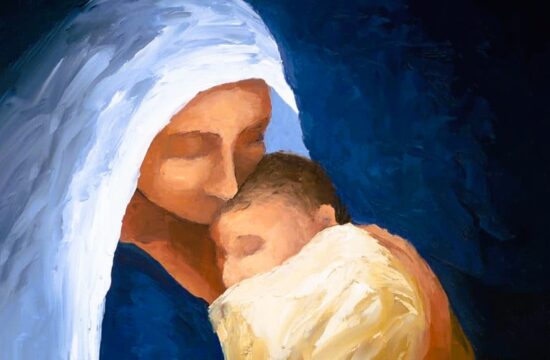When I started seminary 27 years ago, one (of many things) to get acclimated to, rather quickly was the wide variety of opinions on, of all things, Church music. Being an amateur piano player and the number of men being able to play the organ being few and far between, I was assigned to help plan music for Mass and daily prayer. It wasn’t until I had to sit in on some of these meetings and discussions that I even knew that there could be so many very deeply held opinions on hymns. Some might have been subjective, a person simply didn’t like a particular song. Some might have made musical arguments… I remember one person pointing out that “On Eagles Wings” starts on this impossibly high note making it difficult for people to sing. Some you didn’t know if the person was joking – like the priest who said he didn’t like “Amazing Grace” because he didn’t consider himself a “wretch” (as described in the first verse – saved a wretch like me….)
Thanks so much for stopping by to read my homily for the 13th SUNDAY IN ORDINARY TIME -June 26, 2022, for sharing it on your social media posts and your feedback and comments… I’m also grateful for all those who’ve asked for the audio version and share them as well at SOUNDCLOUD click HERE or from ITUNES as a podcast HERE. May the Lord be glorified in your reading and sharing Sincerely in Christ – Father Jim
One argument that stayed with me over these decades was over the hymn “All are welcome.” I forget where I had first heard it sung, but the melody was catchy, the words seemed very warm and inviting, and the refrain was certainly memorable with “All are welcome, All are welcome, all are welcome in this place.” I hadn’t imagined that could be considered a controversial hymn. Why would people have a problem with it? I admit that I kind of tuned out the critics dismissing them as coming across as being very exclusive, closed-off, isolationists.
But over the decades as I’ve seen those words “All are welcome” being adopted as a motto by some churches, and some using that hymn in different contexts, it’s made me kind of reconsider some of those critiques. Because while it’s true, Jesus has come to save humanity from sin and death – that this is a universal offer, this is a universal invitation, this is something He desires for all humanity, that indeed, all are welcome too – – – Jesus is not an ez-pass that we possess so that we can simply drive (anyway we like) into heaven… Which is something that we can all fall into thinking about in our lives of faith and what some incorrectly promote.
At the heart of our scriptures today we hear how God calls humanity to follow Him. But there is an expectation of change on the part of those being invited. In the first reading, we hear about Elijah and Elisha. Elijah was a Major prophet from the Old Testament who was getting up in years, whose service was coming to an end and God had directed him to go to Elisha to appoint him as the prophet who would succeed him. Hearing the passage and some of that dialogue today might have sounded a bit strange with the back and forth between the two of them. But basically, Elisha recognizes that this call he has received is going to change everything for him. That he will need to leave his mother and father behind, he will need to leave the life he knew before behind, which is what we heard in dramatic fashion – he basically burns up his entire livelihood, tens of thousands of dollars of equipment for plowing, and throwing a feast which destroys all his livestock. He basically divests all that he has, is saying goodbye to all he has known. In short, he’s making it clear, that he is not coming back to this life that he knew before. Everything was changing with this encounter with Elijah enlisting him into God’s service as a prophet.
Similarly in the Gospel, we have some pretty dramatic things happening. Jesus starts off in Samaria, which is the last place that his Jewish followers expected to be finding the Messiah. The Samaritans had been considered the long-lost, misguided family members of the Jews. More than that, at this point in history, were considered enemies. That’s why John and James begin by suggesting calling down fire on the Samaritans. They’re thinking they’re being helpful. They are thinking that the Lord wants to send a message of judgment. Jesus is the Messiah. Jesus is the Son of God. Jesus is the fulfillment of the hopes and dreams of the entirety of the Hebrew Scriptures, so they’re thinking that being in this place of sinners Jesus is coming to usher in a final judgment. Jesus rebukes them for this. He is there to bring His love, His mercy… to offer them, the ones considered hopeless an opportunity to be a part of God’s Kingdom. So people point to this as another example of Jesus loving sinners, going to the lost… which he does. He’s going to these very ones and saying He sees, he knows, he loves them – and indeed, all are welcome.

But He doesn’t capitulate to their resistance, their lack of welcome. He doesn’t try to go along to get along with them and their culture, and their misguided beliefs and actions. What does He do? He leaves that place. And as He moves along, He continues reaching out to a variety of people. He invites them to come to follow Him. And He’s expecting that same type of response that we see from Elisha in the first reading – a complete and radical shift of their priorities. St. Luke captures the back and forth with some of the individuals who worry about logistics, who put up somewhat seemingly reasonable requests “let me bury my father first” – “let me say farewell to my family at home.” The responses kind of stun us “let the dead bury the dead” -Jesus really won’t let him go to a funeral? Isn’t it disrespectful not to at least say goodbye to family? The reality is that those requests are more generalized. More than likely they mean “I’ll follow you once my father has died” “let me just tie up some loose ends and then I can come to follow you.” It’s like when we hear people throw out that uncommitted “someday I’m going to do that…”
Jesus isn’t offering some power of positive thinking, life-coaching seminar that he’s trying to get people to sign up for. In the Gospels, the bible isn’t a book that someday we should think about considering among all the other things we read and take in, and selectively pick the parts that we like to hear and apply them to our life. We’re not doing Him a favor by following him, or even by our being here.
Discipleship means that we recognize Jesus as the son of God. That He is the way, the truth, the life. That He can teach us how to navigate the confusing and challenging things we encounter in this world in order to experience the fullness of life now and for all eternity.
So for example, yes Jesus loves the Samaritans. He’s going to them is making it clear that their sins, their errors, have not disqualified them from being a part of the Kingdom of God. But He’s not telling the Samaritans it’s okay that you’re in error about your beliefs, that you’ve corrupted Jewish teachings. He wants the Samaritans, He wants those of the other villages He passes through to come to follow Him, not on their terms, but on His.
Which is the same now as it was then.
We know all too well the tension, the division that has been growing in our nation over a seemingly growing number of topics. And there’s something noble with that impulse to calm some of the angry rhetoric down, to promote unity.
But, not at the expense of the truth. As Catholic Christians, as disciples of Jesus Christ, we have to recognize that following Him supersedes my personal preferences and desires, it’s more important than a political party, race, or even nationality. The call to follow Jesus isn’t about our cherry-picking, editing things to fit our narratives, but rather He has come to save us from ourselves, transform our brokenness, and give us new life. Jesus’ invitation and the call is indeed a universal one, that all are welcome to. But on His terms, not ours.












Thank you Father – I see so much fire and brimstone being thrown at one group or another. No room for discourse and changes of heart when that happens.
These are strange and difficult times for sure Megan. It’s been a delusion and arrogance on our parts up till recently that we were able to navigate things on our own.